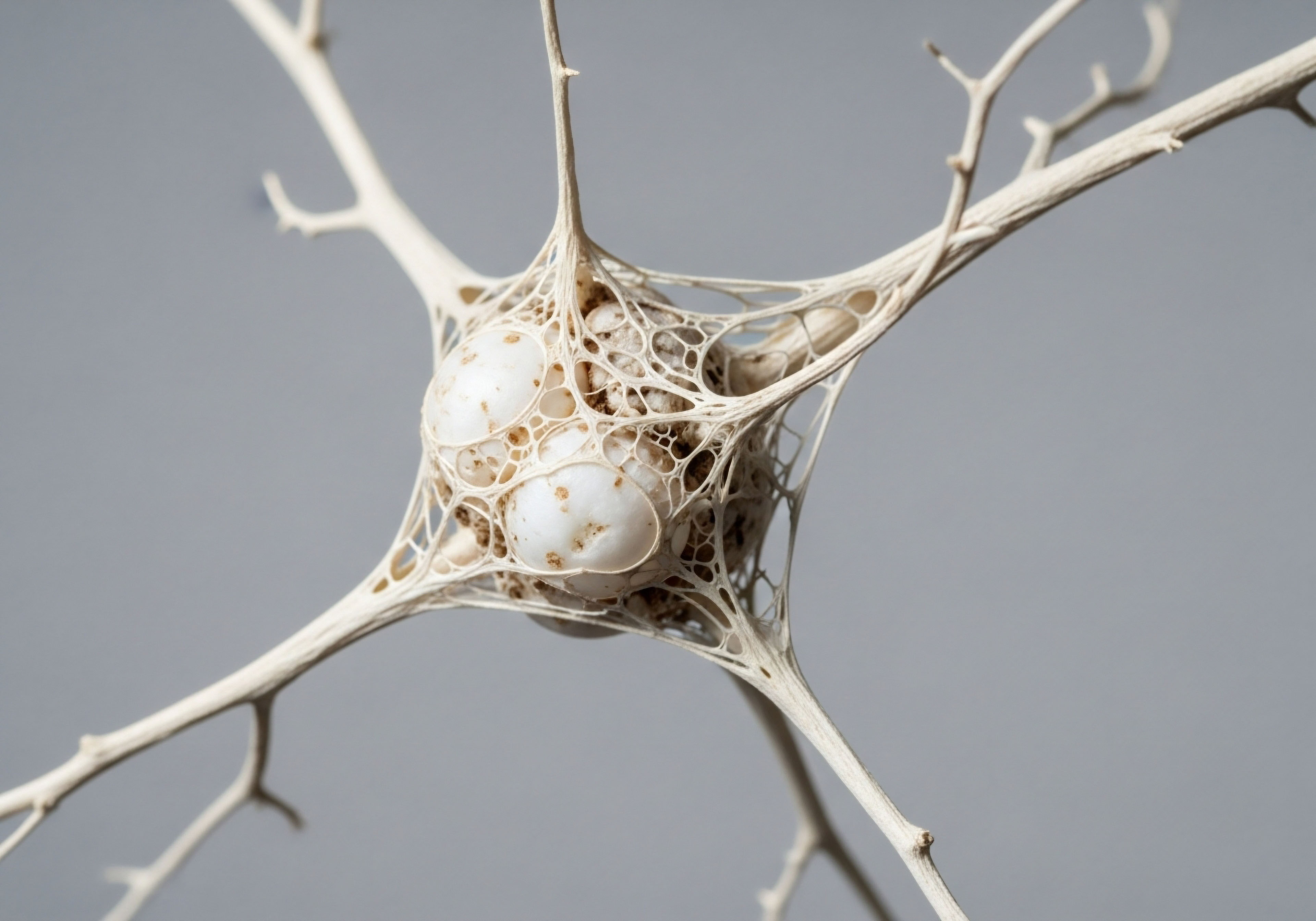

The Nocturnal Symphony of Hormones
The body operates as a high-performance system, a finely tuned engine requiring precise calibration. While many seek to optimize through advanced protocols and strategic interventions, a foundational truth often remains undervalued ∞ sleep stands as the supreme conductor of your endocrine orchestra. It is during these hours of profound rest that the master regulatory systems of your biology undergo their essential reset, dictating the subsequent performance of every cell and system.
Consider the hypothalamic-pituitary-gonadal (HPG) axis, a critical feedback loop governing reproductive hormones. Deep, restorative sleep directly influences the pulsatile release of Gonadotropin-Releasing Hormone (GnRH) from the hypothalamus, which in turn signals the pituitary to secrete Luteinizing Hormone (LH) and Follicle-Stimulating Hormone (FSH).
These gonadotropins then direct the testes and ovaries to produce testosterone and estrogen, respectively. Chronic sleep restriction, a prevalent challenge in modern life, significantly blunts this delicate rhythm. Studies consistently reveal that inadequate sleep diminishes circulating testosterone levels, impacting vitality, muscle accretion, and cognitive drive.
“Clinical data indicates a 10-15% reduction in morning testosterone levels after just one week of restricted sleep (5 hours per night) in healthy young men, mirroring the hormonal decline of 10-15 years of aging.”
Beyond gonadal hormones, sleep profoundly shapes the hypothalamic-pituitary-adrenal (HPA) axis, the central regulator of stress. Cortisol, often termed the “stress hormone,” follows a distinct circadian rhythm, peaking in the morning to promote wakefulness and gradually declining throughout the day to facilitate sleep.
Disruptions to this rhythm, often induced by inconsistent sleep patterns, lead to elevated evening cortisol. This sustained elevation creates a catabolic environment, impeding recovery, compromising immune function, and accelerating biological aging. The body requires this precise ebb and flow to maintain homeostatic balance.
Growth hormone (GH) secretion provides another compelling example of sleep’s endocrine power. The majority of daily GH release occurs during the deepest stages of slow-wave sleep. This powerful anabolic hormone drives cellular repair, muscle protein synthesis, fat metabolism, and tissue regeneration. Consistently depriving the body of sufficient deep sleep deprives it of this vital endogenous growth signal, compromising recovery from physical exertion and limiting the body’s capacity for adaptation and repair.

Metabolic Harmony and Circadian Rhythms
The intricate dance between sleep and metabolic health extends to insulin sensitivity and appetite regulation. Insufficient sleep compromises the body’s ability to process glucose efficiently, fostering insulin resistance. This state forces the pancreas to produce more insulin, increasing the risk of fat storage and long-term metabolic dysfunction.
The delicate balance of leptin, the satiety hormone, and ghrelin, the hunger hormone, also hinges on adequate sleep. Sleep deprivation increases ghrelin while decreasing leptin, creating a biological imperative for increased caloric intake and a preference for carbohydrate-rich foods.
The circadian clock, an internal master timekeeper, coordinates virtually all physiological processes, including hormone secretion. Sleep serves as a primary synchronizer for this clock. When sleep patterns deviate from the natural light-dark cycle, this internal timing system becomes desynchronized. The consequences reverberate throughout the endocrine system, impairing thyroid function, disrupting melatonin production, and altering adrenal gland activity. Optimizing sleep aligns these internal rhythms, allowing hormones to perform their roles with maximum efficiency.


Precision Tuning for Endocrine Output
Mastering sleep to amplify endocrine function demands a strategic, systems-engineering approach. It transcends casual relaxation; it requires intentional design of your nocturnal environment and daily routines. The objective involves creating conditions that optimize the quality and quantity of your sleep, thereby providing the necessary foundation for peak hormonal synthesis and regulation.

The Sleep Environment as a Performance Chamber
Your sleep sanctuary deserves meticulous attention. Light, temperature, and sound represent critical variables. Exposure to artificial light, particularly blue light from screens, suppresses melatonin production, signaling to the brain that it remains daytime. This disrupts the natural sleep onset process.
- Light Discipline ∞ Implement a strict “digital sunset” 60-90 minutes before bed. Utilize blue-light blocking glasses in the evening. Ensure your bedroom achieves complete darkness; even minimal light exposure impacts sleep architecture.
- Thermal Regulation ∞ The body’s core temperature naturally dips to initiate sleep. A cool sleep environment (typically 60-68°F or 15-20°C) facilitates this process. Consider cooling mattresses or low-temperature showers before bed.
- Acoustic Control ∞ Eliminate disruptive noises. White noise machines or earplugs can create a consistent soundscape, preventing sleep fragmentation.

Circadian Synchronization and Daily Rhythms
Your daily habits directly influence your nocturnal endocrine reset. Consistent timing for sleep and wakefulness anchors your circadian rhythm, optimizing the predictable release of hormones.
- Morning Light Exposure ∞ Seek bright, natural light within minutes of waking. This powerfully signals to your brain that the day has begun, initiating the cortisol awakening response and setting your internal clock.
- Movement Protocols ∞ Regular, intense physical activity during the day improves sleep quality. Avoid vigorous exercise too close to bedtime, as it can elevate core body temperature and stimulate cortisol.
- Nutrient Timing ∞ Strategic meal timing supports metabolic flexibility and sleep. Avoid heavy meals close to bedtime. Some individuals benefit from a small, easily digestible snack containing tryptophan-rich foods.
The body requires consistency. Irregular sleep schedules, often termed “social jet lag,” create chronic desynchronization, impairing the HPA axis and diminishing testosterone production. A fixed sleep-wake window, even on weekends, reinforces robust endocrine signaling.


Reclaiming Your Biological Prime
The effects of optimizing sleep manifest with a precision that defies the gradual decline often associated with aging. This process is not a passive acceptance of biological rhythms; it is an active re-engineering of your internal environment. The question of “when” you experience the benefits of amplified endocrine function through sleep is less about a distant future and more about immediate, tangible shifts that compound over time.
Within days, individuals report a profound recalibration of their energy levels. The chronic fatigue that shadows insufficient sleep dissipates, replaced by a sustained vitality throughout the day. Cognitive function sharpens; focus, memory, and decision-making capabilities exhibit marked improvements. The brain, during restorative sleep, clears metabolic waste products, allowing neural pathways to operate with superior efficiency.
“Enhanced sleep quality directly correlates with a 15-20% improvement in reaction time and a significant reduction in error rates across complex cognitive tasks, measurable within weeks of consistent sleep optimization.”
Over weeks, the deeper, more impactful changes begin to emerge. Body composition responds favorably. Enhanced growth hormone secretion supports fat oxidation and muscle repair, while improved insulin sensitivity mitigates fat storage. The reduction in elevated evening cortisol allows for a more anabolic state, fostering tissue regeneration.
Hormonal profiles, once compromised by sleep debt, begin to reflect a younger, more vigorous state. Men experience a resurgence in morning vigor and drive, indicative of optimized testosterone production. Women observe improved mood stability and enhanced hormonal balance.
The long-term commitment to sleep optimization represents an investment in your biological longevity. Consistent, high-quality sleep acts as a shield against the cellular degradation and systemic inflammation that accelerate aging. It supports robust immune function, fortifies cardiovascular health, and protects neurocognitive integrity.
This is the path to extending your healthspan, ensuring that your later years remain characterized by vitality and performance, not decline. The architecture of a life lived at peak capacity rests on the foundation of consistent, deep sleep.

The Endocrine Imperative
Sleep transcends mere rest; it serves as the ultimate command center for your endocrine system, orchestrating the hormones that dictate your performance, vitality, and longevity. Ignoring this foundational truth compromises every other optimization effort. Prioritize sleep, and you unlock your biological potential.



